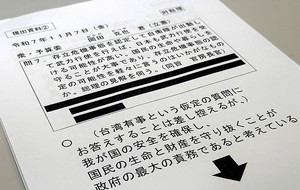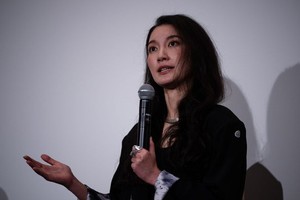Vox Populi, Vox Dei is a daily column that runs on Page 1 of The Asahi Shimbun.
January 14, 2022 at 12:12 JST
 A scene from the “Jokyu-ki Emaki” picture scrolls shows warriors gathered in front of Hojo Yoshitoki, upper left (Asahi Shimbun file photo)
A scene from the “Jokyu-ki Emaki” picture scrolls shows warriors gathered in front of Hojo Yoshitoki, upper left (Asahi Shimbun file photo)
When I visited a bookstore in central Tokyo on Jan. 9, I came across a corner featuring the Hojo clan, which wielded enormous power in the Kamakura Shogunate (1185-1333).
I was surprised by the sheer number of books and magazines that have been published in time for the start of the yearlong TV drama series focusing on the family by Japan Broadcasting Corp. (NHK).
The protagonist, Hojo Yoshitoki (1163-1224), defeated retired Emperor Gotoba, who had ruled the cloister government, in the Jokyu War of 1221 and banished him to the Oki Islands in present-day Shimane Prefecture.
Yoshitoki left a lasting impression of being an irreverent, rebellious vassal for this exploit.
In fact, my high school history teacher branded him as “one of the biggest villains in Japanese history.”
In more recent studies, however, he seems to be rarely characterized as nefarious.
“The prevalent view today is that he should be perceived objectively as a man who reversed the power balance between the court nobility and the warrior class,” said Yoshitomo Nagamura, a lecturer at Toyama University.
He oversaw a special exhibition titled “Yomigaeru Jokyu no Ran” (Reviving the Jokyu War) at the Museum of Kyoto where he worked as a curator until last year.
The event was cut short by the novel coronavirus pandemic, but a set of picture scrolls bearing Yoshitoki’s face was displayed for the first time in 80 years, presenting his clever side that captured the public’s attention.
Kazuto Hongo, a professor at the Historiographical Institute of the University of Tokyo, notes in his recent book “Hojo-shi no Jidai” (Era of the Hojo clan) that the source of his power lay in his “extraordinary Machiavellian talent.”
He also excelled at “nemawashi,” or laying the groundwork for his plans by heeding and coordinating the wishes of warriors, which enabled him to establish the foundations of the political control the Hojo clan wielded for a century.
In the opening episode of NHK’s drama “Kamakura-dono no 13-nin” (The 13 Lords of the Shogun) on Jan. 9, actor Shun Oguri played the youthful Yoshitoki, who was not yet particularly bright or ambitious enough to plot and connive.
He actually came across as refreshingly endearing, not knowing what to do as he gets bossed around by his headstrong older sister, Masako, and her husband-to-be, Minamoto no Yoritomo.
Screenwriter Koki Mitani's intention is to “not glorify” Yoshitoki but portray him as a “villain with depth.”
I am looking forward to finding out what kind of a schemer he will become.
--The Asahi Shimbun, Jan. 10
* * *
Vox Populi, Vox Dei is a popular daily column that takes up a wide range of topics, including culture, arts and social trends and developments. Written by veteran Asahi Shimbun writers, the column provides useful perspectives on and insights into contemporary Japan and its culture.




















A peek through the music industry’s curtain at the producers who harnessed social media to help their idols go global.
A series based on diplomatic documents declassified by Japan’s Foreign Ministry
Here is a collection of first-hand accounts by “hibakusha” atomic bomb survivors.
Cooking experts, chefs and others involved in the field of food introduce their special recipes intertwined with their paths in life.
A series about Japanese-Americans and their memories of World War II